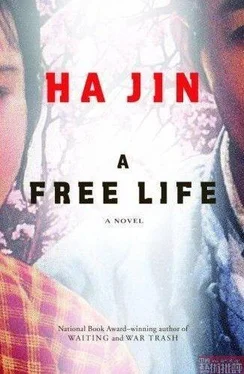"Keep in touch, Taotao," said Livia as she followed her mother to the passenger van.
"Sure." The boy nodded.
"Remember, I'm your friend." She waved her thin, short-nailed hand. Her flip-flops seemed too big, pattering on the driveway. "Sure, thanks for the cube."
The Wus waved as Heidi's van drew away. The boy returned to the living room, to the unsolved puzzle.
The Atlanta apartment book arrived, a thick volume containing hundreds of listings. Pingping and Nan were impressed by the rents, which were much more affordable than in the Boston area. They folded several pages that showed housing in the eastern suburbs. But to their dismay, there was only one listing in Lilburn, and that place was too pricey, so they had to look for an apartment in an adjacent town. They noticed that housing was much cheaper in some areas near Stone Mountain, a town six miles south of Lilburn in Dekalb County. Nan phoned two of those places. Without difficulty he rented a three-bedroom apartment at Peachtree Terrace, which was within Gwinnett County and, according to the map, just a fifteen-minute drive from the restaurant. Nan wanted a study for himself, hence the third bedroom. Ideally, Pingping had hoped they could walk to work, but Nan told her that unlike Boston, the city of Atlanta sprawled in every direction, one having to drive to get around, so they'd better stay at Peachtree Terrace. The rent was a reasonable $550 a month.
A UPS van came to pick up their boxes. Altogether there were thirty-five. The driver was a tall woman with a squarish jaw and a tanned face. She wore the brown uniform, the short-sleeved shirt showing her muscular arms and bulging chest. Nan helped her load the shipment and was impressed by the ease with which she lifted the heavy boxes and lodged them onto the shelves in the van. He liked to see the woman work with her sinewy hands and could feel energy radiating from her sturdy body.
When everything was loaded, she assured him that the whole batch would arrive intact. With a ballpoint attached to a clipboard she scribbled an X at the bottom of a form for his signature, then handed the paperwork to him. He signed it and asked her to handle their boxes carefully, though he didn't reveal that the shipment contained a microwave, a roaster, a computer, even a TV set. He gave her a ten for tip, and she beamed, panting a little. She promised to stick fragile labels to all their belongings when she got back to the local UPS headquarters.
What a woman, so hardy and so independent! Nan watched her hop into the brown van and pull it out of the yard.
on the morning of July 6, a Saturday, the Wus got up at four o'clock. Pingping had put blankets and pillows in the backseat of their car the night before. As Heidi had instructed, she checked all the doors and windows, then left the key on the kitchen table and locked the front door. It was still damp and chilly outside. She couldn't stop shivering as she walked toward their loaded Ford parked in front of the garage.
There was little traffic on I-95, and a faint mist veiled the land on both sides. The hazy air seemed stirred by the shafts of light projected by their car and was rolling by like strips of smoke. The woods on the roadside were dark and looked as solid as if they were a rocky bank. Pingping was happy and excited. Despite knowing that Nan didn't completely love her, despite getting carsick easily, she felt hopeful and safe with him. Their move to Georgia showed that he was willing to live and raise Taotao together with her. Don't mind going anywhere as long as we're together, she told herself. The more you move, the stronger you'll grow, not like a tree that can be killed if you uproot it. Sick of living under Heidi's roof. At last we can have a place for ourselves.
She looked at Nan, who seemed calm. In fact, he had been better tempered these days. He was driving steadily in spite of their old car that wobbled a little and couldn't overtake any vehicles on the road. Ahead of them, the blacktop looked endless and mysterious, yet Pingping was sure it was leading them to a new life. Deep down, she knew Nan would work hard and together they would make a decent living.
When they had passed New London, Connecticut, suddenly the sun came out, a giant disk flaming a good part of the eastern sky. More cars appeared on the highway, and patches of ocean shimmered as they went. Pingping kept telling Taotao to look at the sun and the water, but the boy just grunted. He was too sleepy to open his eyes, dozing away all along.
Because their car was fully loaded, Nan wouldn't let Pingping behind the wheel at first. From time to time she kneaded the nape of his neck to relieve his tension. She could see that he was nervous, especially whenever a semi passed them, its powerful wake shaking their car a little. This happened more frequently as they were approaching Stamford. Yet somehow she felt peaceful. As long as the three of them were together, she wasn't afraid of restarting their life anywhere.
They didn't want to get stuck in New York City traffic, so Nan turned onto I-287 as soon as they cleared the Connecticut border. After he drove a dozen miles or so west, the Hudson River emerged, immense, serene, and as breathtaking as the ocean. A lighthouse stood on the eastern bank like a behemoth penguin gazing at the distance. Many white houses on the western shore were drenched in the sunlight and nestled in the woods on the hills along the water, against which herons and gulls were sailing and bobbing. Far away, a yacht was churning a whitish trail. Swarms of sailboats were moored in the southwest, their sails fluttering like wings. Other than those small vessels, there was no trace of disturbance on this wide and tremendous river. Near the lower end of the Tappan Zee Bridge, a red stubby boat was anchored and planted with fishing rods; two men were sitting on it, smoking and drinking beer. Nan veered into the outside lane and slowed down some so as to take in more of the view. If only he could live in a place like this, so clean and tranquil. The river, though mighty and vast, wouldn't be roughened by storms and hurricanes the way the sea was. The hills on the shore were as bright as if every treetop, though viewed from the distance, were distinguishable. What a sublime place! Who were the lucky people living in these hills? How fortunate they were to be able to enjoy the peace and quiet here. If Nan came back to this life again and could choose where to live, this would definitely be one of his choices.
"This sight beats the Yangtze," said Pingping.
"Also the Yellow River," echoed Nan.
They both laughed, then Nan tooted the horn. "Don't do that," Pingping said. "You might confuse other cars."
Soon they entered New Jersey. It was getting hot, the wild grass on the roadside flickering in the withering breeze. Then hills appeared, most of them wooded heavily and some devoid of human traces. Pingping felt drowsy but forced herself to chat with Nan so he could remain alert. He told her to take a nap and not to worry about him, because enjoying the scenery would keep him awake.
After they turned onto I-78, the land was still rugged, and some places were crowded with houses and buildings. The Wus took a lunch break at the first rest area after the toll bridge over the Delaware River so as to avoid the gathering heat. Around two-thirty, they set off again. Taotao kept asking what crops were growing in the vast Pennsylvanian fields. His father told him they were corn and soybeans. Nan was struck by the undulating landscape, so sparsely populated that most farmhouses looked deserted. Few human beings were visible on the farms, while dappled cows with bulging udders grazed lazily in the meadows. There were also horses and colts walking or lying in the distance. The land was rich and well kept, though some pastures were enclosed by wire fences. The sight reminded Nan of his first impression when he had come to the United States six years ago-he had written to his friends in China that nature was extraordinarily generous to America; it was a place that made their native land seem overused and exhausted.
Читать дальше












